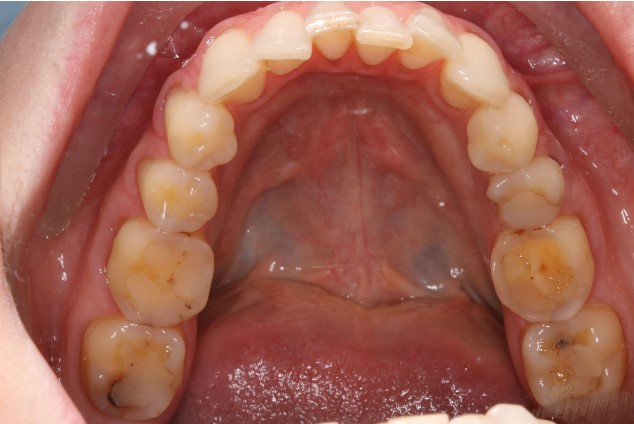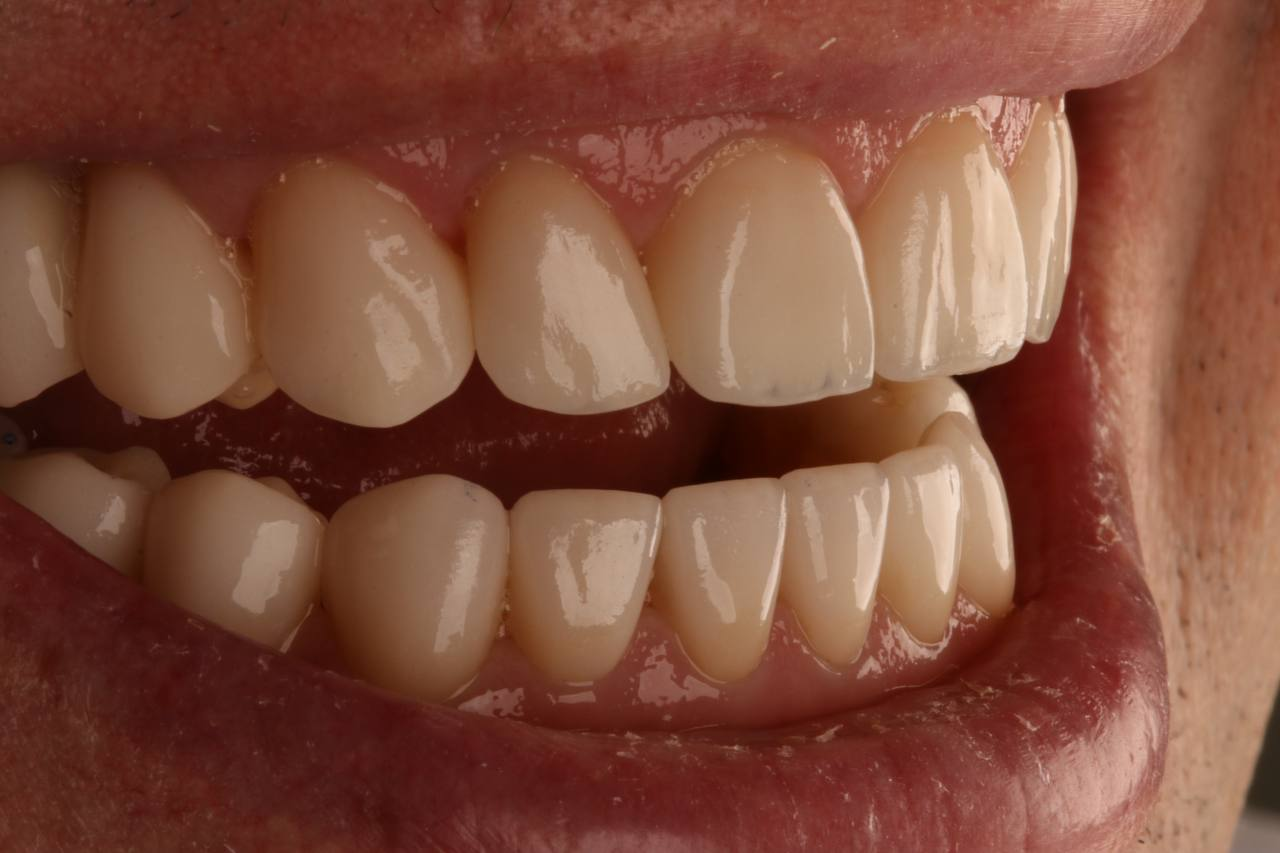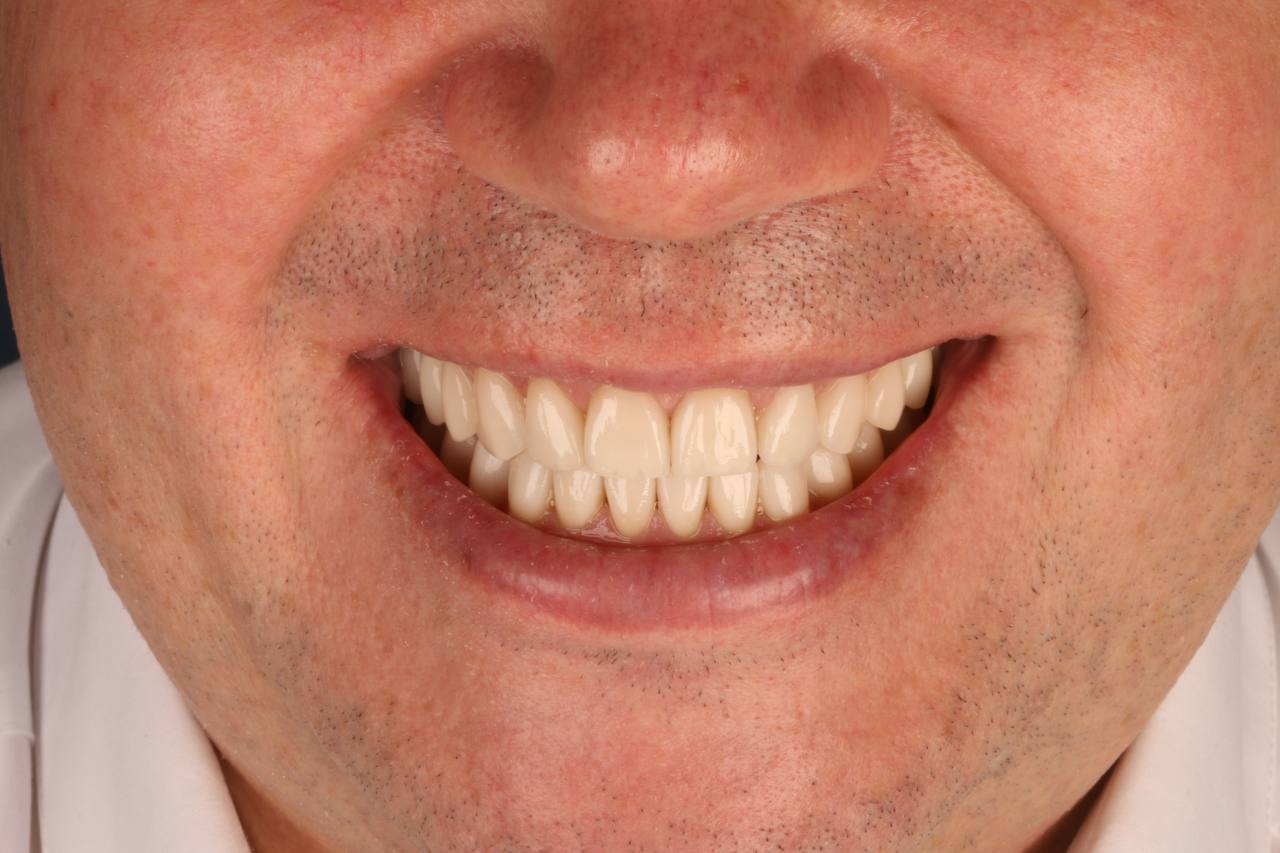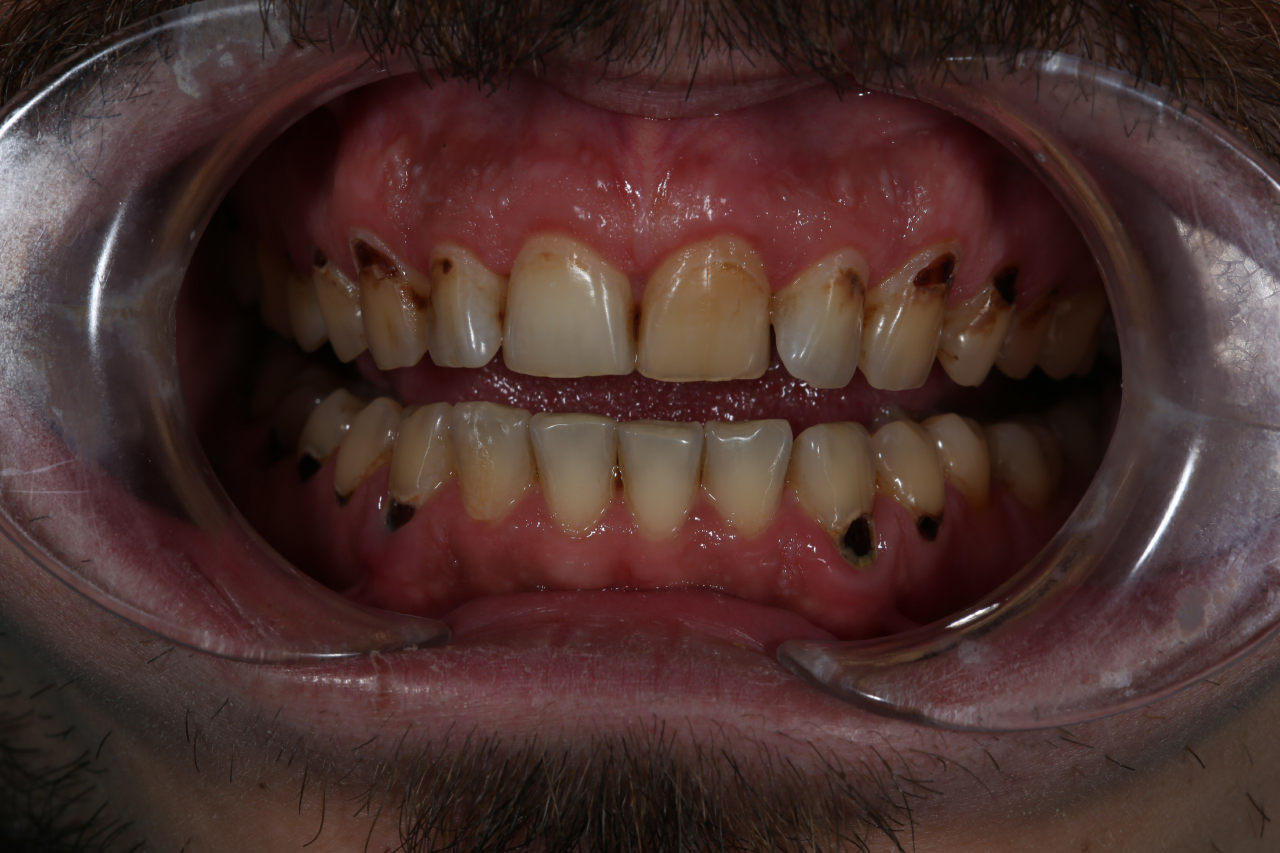Starting from about the 20th patient, I learned to recognize the general profile from the first glance into the oral cavity. This was independently noticed by colleagues. Perhaps I will later take up scientific work on common diseases of IT professionals when I accumulate statistics, but for now I just want to tell you what is wrong with your teeth. And ask you a few questions, the answers to which will help to confirm or refute the primary hypotheses.

Abrasion on the lower jaw.
I will clarify right away that this is most likely not about your specific teeth and not about typical teeth of an IT specialist, but about typical teeth of an IT specialist who realized that you need to see a dentist. That is, the sample is only those people who consciously realized that something was wrong in the mouth. It is the lack of understanding of a wider sample that leads to questions, because it seems that I did not know much about IT specialists before.
In short, my patients in this profile have four main problems:
- Impaired salivation due to night work, dehydration, or stress.
- The habit of snacking on junk food (pizza, cookies).
- A sedentary lifestyle since childhood, which in general affects the formation of posture, skeleton and bite.
- The habit of blocking bodily signals: developed "built-in" autoanesthesia.
Let me tell you what I saw in the teeth.
Salivation disorder
Saliva protects the teeth and washes them. The normal environment of the oral cavity is slightly alkaline, and if damaged, it sharply accelerates the rate of damage to the teeth as a result of exposure to the external environment and aggressive microorganisms.
The main thing that disrupts the correct salivation is the shift in activity to the night, that is, the disturbed daily routine. The body produces much less saliva at night than during the day. Complete inversion of the working day to night mode for a long period of time does not sufficiently rebuild this system, so those who work at night often sit with insufficiently moistened teeth.
My first question to you: Do I understand correctly that there are specific professions or specializations among IT professionals that require a night work day or a ragged schedule with night work? Among the patients I interviewed, almost all worked at night, but I don't know how typical this is for IT professionals in general.
The second factor is probably as significant as the first: regular background stress. Some of the features of the bite mechanics make me assume that IT professionals work under conditions of high psycho-emotional stress. I would rather expect this from an air traffic controller, or a bodyguard, or a manager with great responsibility. Actually, this is called the "manager's syndrome".
With regard to teeth, it is easy to diagnose: smile in front of a mirror. If you can tell the canines from the chewing teeth and incisors by their shape, everything is in order. If there are no characteristic cones or at least bumps, and the surface is straight, then you need to think about rest.
The third factor is the love of coffee. Coffee has a rather acidic environment, which creates the same imbalance in the oral cavity, which further leads to an active growth in the number of microorganisms, which later manifests itself in a large amount of calculus and caries. Also, coffee, due to its dehydrating effect, reduces the amount of saliva secreted.
The fourth factor is dehydration. Patients seem to drink little while focusing on work.
If you have a history of cardiovascular diseases and allergies, it is also important to check the water balance. Rhinitis allergies, for example to dust, mean difficulty in breathing through the nose. And mouth breathing is a prerequisite for the development of dental problems, because saliva evaporates more.
What can you change:
- Observe the daily routine (I believe in this a little).
- Drink plenty of fluids, but not coffee. If you need something invigorating, green tea is better. If just a liquid, then water or natural juices. Avoid juices with sugar.
- Rest normally (maybe). I don’t have enough data here, but most likely I need breaks for physical activity.
- : , . — , . .
- — .
There are two basic hypotheses: either patients of this profile need a high-carbohydrate diet due to the fact that they are constantly under conditions of mental stress, or patients like to snack right at the workplace, and they prefer the most prepared food so as not to be distracted.
Plus there are digestive problems (caused by diet + often immobile lifestyle). Gastritis means acidic vapors ascending the esophagus, and this changes the balance of the environment of the oral cavity to a more acidic side, that is, it demineralizes, making the enamel vulnerable.
Overall result: There is a lot of adhesive food in the diet. Microparticles of the same cookie mix with saliva and form a glue that hardens on the surfaces of the teeth. This allows pathogens to quickly build up a biofilm on the surface of the tooth.
Please tell us if it is normal for an IT professional to eat pizza during the day or snack on cookies, chocolate, etc. with tea during work.
What can you do:
- Add more vegetables and fruits to the diet and remove sweets (I believe a little).
- There is normal warm food instead of fast food (taking into account the spread of online deliveries, I believe more).
- Equalize sleep patterns until you feel like eating breakfast. Breakfast at 12:40 and a hearty dinner at 23:00 is bad for the teeth as well.
- . , : , , - . . - , . — , , , . , .
- — . ( ), , , . . , , .
This is an unlikely hypothesis: I imagined the typical programmer to be a nerd, but my colleagues say that this has not been the case for a long time. We do not know what is primary: the presence of mild connective tissue dysplasia, which skeletally manifests itself as high joint mobility, or "thin bone" and a relatively low percentage of muscle mass, and as a result - a tendency to books, and not to mobile types of spores. Or vice versa, but these two phenomena seem to be correlated.
This also affects the teeth, in particular the bite. That is, in the end, it is not good with orthodontics.
Posture is also associated with bite, but I see its changes in almost all of my patients.
Obviously, I have very little taxonomy data, and I would like to hear your opinion on how athletic IT professionals are in general.
What you can do: Move more.
Light autoanesthesia
This is the most unlikely hypothesis. Several times in clinical practice, “video game player caries” and “computer caries” have been mentioned, but there has been little research. The hypothesis is that people who are carried away by some kind of activity focus on it and can partially block bodily signals. This is a fairly typical situation for any streaming activity, and it is achieved by training. To what extent this applies to IT professionals, I don't know.
What can you do:if you feel pain, then do not practice to endure it and go to the doctor. Usually, it is much better to heal earlier than with the development of pathology. And this applies not only to dentistry. In the case of dentistry, your check will grow by an order of magnitude, and in the case of other body systems, a completely unnecessary chronic diagnosis may appear.
What a patient profile looks like

Teeth with strong abrasion, photos before ...

... and this is after

Another angle to see the result.

Teeth with caries on the anterior surface.
Note for slightly clenched teeth due to possible manager syndrome. Normally, the total area of all contacts is 0.5-1 square centimeters. When there are more contacts in area, this causes the activation of the muscular system, there is a signal that it is necessary to squeeze more tightly, because there are no half positions: either the teeth are slightly closed or compressed. And normally the teeth close evenly and open. No one with closed teeth constantly walks. If multiple uniform contact does not occur, an imbalance is formed, when one side of the jaw closes first, then the other, and an elastic deformation of the jaw develops, causing abrasion.
This causes tension: the teeth become covered with microcracks. Microcracks mean the development of caries. When the enamel is erased, dentin is exposed, and it is less mineralized. Dentin cannot withstand the acidity of conventional foods and starts to wash out faster. This shortens the life of the teeth. As a result, at the age of 45, you need to buy new teeth. Treatment in such a situation will be accompanied by a total restoration with crowns.
Is it being treated?
Yes. We can fix almost everything quickly. Bite and other orthodontic problems - slow but effective. Whether it is expensive or not depends on the stage. I would not want a patient to come when all this is being treated at a high price. Alas, the peculiarity of dental diseases is that unreleased forms are often asymptomatic. Imaginary well-being - when he asks for help, but it's too late and expensive. This usually happens at the age of 45, when it is necessary to disassemble the entire jaw and reassemble.
General recommendations for prevention - as in many other areas: daily regimen, drinking regimen, diet.
If you hope that in 5–15–25 years you will receive implants, then I will disappoint you: even at the forefront of science, there is still nothing that would replace teeth completely. And in clinical trials for the next seven years, fundamentally new implants have not been announced. Now an implant is a good alternative to a missing tooth, rather than a natural normal one.
PS If you decide to go to our clinics - say that you are from Habr, there will be a small 5% discount.